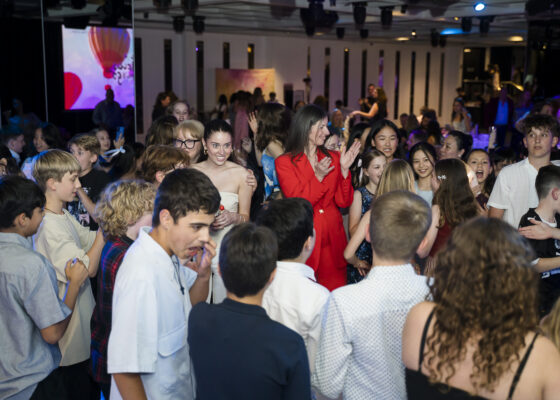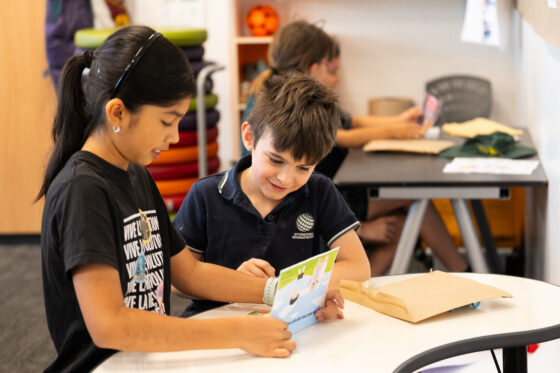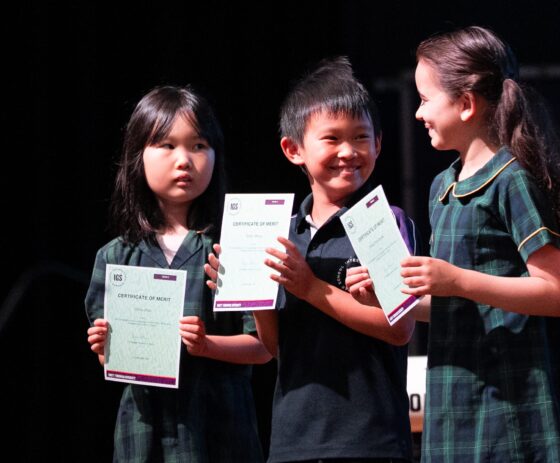The Primary Co-curricular Clubs Program provides students with the opportunity to explore their interests, develop new skills, and grow both physically and mentally. From a wide array of activities, students can engage in programs that complement their learning journey and promote personal growth beyond the classroom. Whether in sports, arts, or skill-based clubs, students benefit from the guidance of dedicated coaches and educators, many of whom have been long-standing members of our school community.
This dedication is exemplified by instructors like Kancho Ino and Shihan Leigh, who has been with IGS for 20 years, watching students grow both in their karate techniques and throughout their school years. Since 2004, Jin Sei Ryu Karate-Do, led by Ino and Leigh, has offered classes to IGS students from Year 1 to Year 12, teaching over 1,100 students and helping them develop both their martial arts skills and personal growth.
We interviewed Ino to gain deeper insights into his philosophy and motivations, drawing on his 50 years of experience in karate-do.
After five decades of practising karate-do, how has your understanding of its philosophy evolved?
Over the years, my understanding of karate has evolved from viewing it purely as a physical discipline to appreciating it as a lifelong journey of personal development. As a young child, my focus was on mastering techniques and achieving external goals, such as earning belts and winning competitions. Over time, I’ve realised that karate-do is more about cultivating inner qualities like patience, resilience, and self-control. It’s not just about defeating an opponent; it’s about overcoming our own limitations. Jin Sei Ryu Karate-Do continuously refines our character and encourages us to pursue individual growth in all aspects of life.
What do you believe is the ultimate goal of practising karate-do? Do you see it as mastery, inner peace, or something else?
Karate-do differs from karate in that it extends beyond the dojo into all areas of life. The lessons learned in karate can be applied elsewhere, from school and work to social interactions and other activities like music, drama, or sports. The Jin Sei Ryu Karate-Do logo, a ripple, symbolises how students, as they master techniques and help others to begin positively influence their communities. The ultimate goal of karate-do is not just mastery or inner peace but becoming a person who contributes selflessly to the world around them.
Can you recall a pivotal moment early in your training that solidified your commitment to karate?
I wouldn’t be where I am today without the commitment and belief of my parents, who supported my participation in karate from the very beginning. They dedicated countless weekends driving my sister and I to karate tournaments and seminars up and down the East Coast of the United States, encouraging us through both disappointments and successes. Their support gave me the confidence to persevere. My father watched me teach classes in New York City until he passed away, and my mother continues to encourage me, even after more than 50 years of training.
What were some of the biggest challenges you faced in your early years of training, and how did you overcome them?
As a smaller competitor, I often found myself up against larger opponents, without allowances for weight or size in the early days. I had to adapt by focusing on my strengths, technique and speed. In competition, I often out-manoeuvred bigger competitors and excelled in kata (floor exercises). I also strived to be an all-round competitor, excelling in multiple events like sparring and board breaking. This taught me to focus on my strengths and work on my weaknesses, ultimately winning the overall grand champion title of our International Karate Organisation for six consecutive years from 1990 through 1995, a record that remains unmatched today.
What do you believe students gain from karate that they might not find in other disciplines or in a classroom?
Karate-do offers a unique combination of physical, mental, and spiritual training that extends far beyond self-defence. Students gain confidence, discipline, and a strong sense of community. They learn to manage stress, respect others, and set personal goals. Karate-do serves as a framework for personal growth that can be applied in numerous areas, such as school, work, other sports, and hobbies. It instills resilience, teaches responsibility, and provides life skills that are valuable in any setting.
Year 11 student Caitlin who has been a student of Ino and Leigh’s for almost 12 years and is a karate National Champion reflects this sentiment,
“One thing that I have learnt in karate that is useful for school is being comfortable with failure. I compete in many tournaments, where I fight one on one combat. As there can only be 1 winner, I haven’t always won and over the years I have learnt to be okay with not winning. I used to see it as a moment of failure, but now I see it as an opportunity for growth. I then apply this to my schooling, especially in my final year. For example, when I don’t get a result I was hoping for, I don’t get upset. Instead I apply the feedback and improve, because I know that without failure there is no growth.”
Can you share a short story of a student who profoundly impacted you as an instructor?
One of my early teaching experiences was at the Young Adult Institute in New York City in 1985-1986, where we taught people with intellectual disabilities. Despite the challenges, the students were incredibly enthusiastic and committed. After six months, they successfully graded for blue belt, and one student, about 40 years old, shared that it was the best day of his life. He explained that, for his entire life he had been told what he couldn’t do, but through karate, he discovered what he could achieve. His transformation, from struggling to do one push-up to performing ten, was a powerful reminder that individual growth is relative and deeply personal.
We recognise that there are countless ways to achieve excellence in karate, and we do not prescribe a one-size-fits-all approach. While we maintain standards, we continuously adapt our methods to meet each student’s unique journey. This was a profound moment for me as a karate instructor.
What is the most rewarding aspect of teaching karate after so many years of practice?
The most rewarding aspect is witnessing the long-term development of students. Watching children who began their journey in Year 1 progress through the ranks, achieving junior black belts in primary school and senior black belts by the end of Year 11, is incredibly fulfilling. Many of our students continue training with us well into adulthood and for many years, excelling in other areas of their lives and maintaining personal connections with their dojo community. Seeing this growth, not just in karate but in life, is truly our greatest reward. Similarly, Caitlin attests to the rewards of karate in her life,
“I used to stay in my comfort zone and not try new things. But after testing my limits in karate, a safe environment, filled with support, I have learned to push beyond my boundaries and step into the uncomfortable. Nowadays, I say yes to opportunities even when I am scared, because I want to see how far I can push myself, otherwise I will never know. I try new things, and if I get knocked down, I now know that I can get back up and try again.”
Ino and Leigh’s dedication to teaching karate-do at IGS over the past two decades exemplifies the impact that committed instructors can have on students’ lives. His passion for karate-do extends beyond technique, shaping students’ character and fostering a sense of resilience and personal growth. The Primary Co-curricular Clubs Program thrives because of mentors like Ino and Leigh, whose dedication helps students not only in the dojo but in all aspects of their development. As students continue to explore their interests, they are encouraged to push their boundaries, learn from challenges, and grow into confident, well-rounded individuals.



















